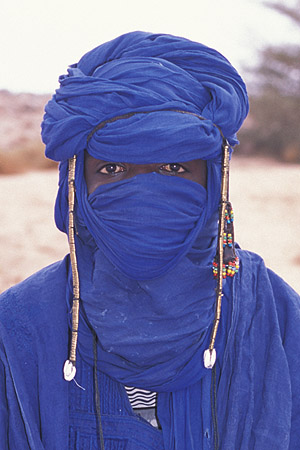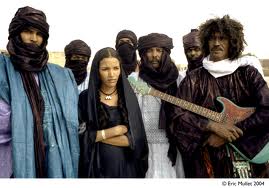By Conor Godfrey
(Hello to all Jim’s readers! The actual Answerman is off finding answers in Southern Africa, so I have been asked to amuse and entertain for the better part of March—I will do my upmost.
Jim and I share some interests and opinions, and diverge quite a bit in others, so I hope you enjoy a brief change, and please feel free to leave comments or email me at [email protected] if there is an issue you would like to see covered.)
The Blue People, the People of the Veil, the Tuareg: to the people-groups that live south of the great desert, these veiled nomads are known as warriors, slavers, merchants and cattle raiders, and have been doing all of the above ever since the camel was introduced to N. Africa around 0 B.C.
For the last millennia, the Tuaregs have controlled the five most lucrative trade and smuggling routes across the Sahara – after all, the 1.2 million Tuaregs that roam the Sahara are more intimate with the desert than we are with our kitchens and bedrooms.
E.g. We call the sandy expanse from Algeria to the Red Sea the Sahara Desert; the Tuaregs see this as dozens of different deserts, each with its own name depending on its aridity, elevation, vegetation, etc…
This interlocking web of deserts goes by the name “Tinariwen”, in Tamasheq, the main dialect of the Tuareg people.
Tinariwen is also the name of a Tuareg band that won the Best World Music Grammy last week.
The band Tinariwen is what I imagine the Sahara Desert would sound like if you gave it an acoustic guitar and a drum.
“Tenere” – the Tamasheq word for the true, deep desert, is the band’s ancestral and spiritual home. Have a listen here.
They were even on the Colbert Report when they were promoting the music Festival au Desert in Timboctu. NPR calls them the best acoustic rock group of the 21st century.
There was, however, another reason the Tuaregs were in the news last week. While Tinariwen was sporting their best Boubous to collect their prize, 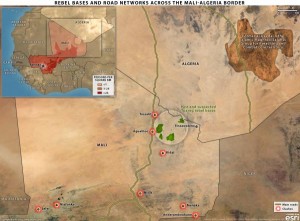 other Tuaregs were rolling over strategic towns in Northern Mali and skirmishing with the Malian army (See map of conflict on the right.)
other Tuaregs were rolling over strategic towns in Northern Mali and skirmishing with the Malian army (See map of conflict on the right.)
The ‘rightness’ and ‘wrongness’ of this conflict (and the other Tuareg rebellions over the last century) is very difficult to parse, and probably immaterial.
When African states in the Sahel gained their independence in the 1960s from, in this case, France, they attempted to assert control 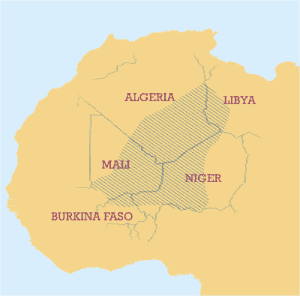
At the same time, the trans-African trade was increasingly moved by sea, making the two thousand year old caravan routes less and less profitable.
The Tuaregs turned their dessert expertise toward less savory commerce– hostages, drugs, and guns for hire—which put at least some Tuaregs in contact with al-Qaeda and other nefarious groups.
The Tuaregs are NOT Islamic extremists – their brand of nomadic Islam is heavily blended with millennia old animist traditions, and would probably give a hard line Islamist a heart attack.
Tuaregs that do come in contact with al-Qaeda do so for pragmatic, financial reasons.
Also, the various governments abutting the Sahara have every incentive to play up the al-Qaeda – Tuareg link because the U.S. then shells out cash and personnel for military and anti-insurgency training.
(It did not help the Tuareg case that 800 Tuareg warriors fought alongside Moammar Gadhafi’s troops in the recent civil war.)
The Indigo people are a relic of the pre-nation state era; a trans-national people so intimately tied to their land that modern borders are not only unenforceable but totally irrelevant.
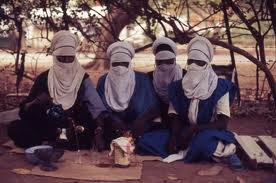
Ironically, Tuareg champions are now adopting the modern world’s nationalist rhetoric to express their people’s aspirations.
Malian Tuaregs and some non-Tuaregs have formed the National Movement for the Liberation of Azawad… Azawad being the local name for the Tamasheq speaking regions of Mali, Niger, and Algeria.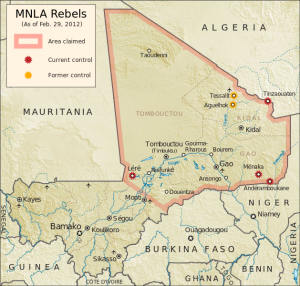
The Associated armed group has been renewing the armed struggle for a Tuareg homeland since late January, 2012.
In many ways the Tuaregs have a more coherent cultural and geographic claim to nationhood than many of the modern world’s balkanized republics. Said another way, they are arguably as distinct from their Southern neighbors as the South Sudanese were from their Arab neighbors to the North.
It is difficult to watch some of the last trans-national nomads locked in a losing struggle with the modern world.
As many of the world’s nation states splinter along civilizational lines (Iraq and Syria, Sudan(s), Nigeria, etc… ), and identity politics grows stronger in developed and developing world alike, I wonder the Tuaregs were not simply ahead of their time in thinking that national boundaries were just imaginary lines in the sand.
